Built using Dutch know-how, the kingdom’s iconic three-wheelers are charged up and ready to go
By Maxmilian Wechsler
By Maxmilian Wechsler
| Despite improvements in technology – notably the original, polluting two-stroke, petrol engines being replaced by liquefied petroleum gas (LPG) and compressed natural gas (CNG) engines – the tuk-tuk is still regarded as a relic of the past, in need of a makeover. That’s about to happen, thanks to the efforts of Dennis Harte, a 31-year-old Dutch engineer, whose Tuk Tuk Factory (TTF) assembly plant in Samut Prakan is taking Thailand’s ubiquitous three-wheeler to the next phase. |
Dennis believes that silent and emissions-free electric models are the wave of the future. He feels strongly about the need to take fossil-fuel guzzling vehicles off the roads, and is doing something about it. TTF currently assembles four models of electric tuk-tuks of its own design in Thailand and exports them to the Netherlands and seven other European Union (EU) countries, with more on the way. He is also upbeat about the prospects of electric tuk-tuks in the local market.
Dennis invited me to test drive an electric tuk-tuk that had been assembled in a few hours. Regular readers of The BigChilli may be familiar with my reviews of luxury vehicles and supercars, but I have to say that in its own way a spin in this little three-wheeler was as enjoyable as test-driving a Ferrari.
Having never handled anything like this before, it took me a few minutes to get used to its three-wheel drive. The red Classico model I tested took off like a bullet – the acceleration is quite amazing. The driver’s seat was comfortable, it went pretty fast, and most importantly, it was absolutely quiet.
The electric tuk-tuk was stable in turns and the brakes were excellent. It was so much fun I couldn’t stop driving it around the compound. I am sure that every tuk-tuk driver in Bangkok will go for it when they get a chance to drive one. Maybe Dennis should include a meter for the local market to save bargaining the fare.
Clearly there is an expanding global market for clean, quality tuk-tuks. They’re gaining popularity in many countries in Africa, South America, Europe and throughout Asia. Lately tuk-tuks have even found their way to the United States.
Dennis invited me to test drive an electric tuk-tuk that had been assembled in a few hours. Regular readers of The BigChilli may be familiar with my reviews of luxury vehicles and supercars, but I have to say that in its own way a spin in this little three-wheeler was as enjoyable as test-driving a Ferrari.
Having never handled anything like this before, it took me a few minutes to get used to its three-wheel drive. The red Classico model I tested took off like a bullet – the acceleration is quite amazing. The driver’s seat was comfortable, it went pretty fast, and most importantly, it was absolutely quiet.
The electric tuk-tuk was stable in turns and the brakes were excellent. It was so much fun I couldn’t stop driving it around the compound. I am sure that every tuk-tuk driver in Bangkok will go for it when they get a chance to drive one. Maybe Dennis should include a meter for the local market to save bargaining the fare.
Clearly there is an expanding global market for clean, quality tuk-tuks. They’re gaining popularity in many countries in Africa, South America, Europe and throughout Asia. Lately tuk-tuks have even found their way to the United States.
Thailand’s traffic-beaters |
How it started
“I had been fascinated with tuk-tuks for many years and chose to work on them for my graduation project with my colleague Marijn van der Linden” explained Dennis, who earned a master’s degree in industrial engineering from the University of Delft in the Netherlands in 2008.
“In 2007, everybody was talking mostly about hydrogen and other engines, but I knew that electric was the future of tuk-tuks. While still at university, I started to work on tuk-tuks with Tuk Tuk Company (TTC), a Dutch firm that introduced tuk-tuks to Holland.
“They were importing the vehicles from Thailand and faced problems with the maintenance. The petrol engine was dirty, so it didn’t comply with European standards. They had to test every tuk-tuk, one by one, in order to obtain a permit. They asked me and Marijn to improve them.
“We did some studies and decided to design a new conceptual electric tuk-tuk. I designed the interior and Marijn the exterior. Then, in 2009, we formed the TTF to produce electric tuk-tuks in collaboration with TTC. TTF is also registered in Holland and we produce the tuk-tuks in Thailand.
“The good thing about tuk-tuks, besides being cute, is that they normally operate within the same area. This makes them a good match for electric drive-trains that have to be recharged. The drive-train consists of a battery, motor and the motor controller,” Dennis said.
“The battery and the motor can be quite expensive, but if you limit yourself in speed, not going over 50km/h, and you limit yourself to a certain area, then the expense is lower.
“We started the business in 2009 with our new director Roland Vos, a former Unilever executive. First we took old petrol tuk-tuks and put in electric drive-trains. Later we stopped converting old tuk-tuks and started to make completely new vehicles instead.
“We also discovered that a lot of people around the world are actually very enthusiastic about Thai tuk-tuks, but the quality of these vehicles is sometimes not so good – for instance, the seats and suspension. More importantly, though, they are never electric.
“My boss decided that Thailand is the best place to make tuk-tuks and he arranged for Tiger Motor Company to manufacture the prototype. I was on hand here to manage it because I am an engineer familiar with all the European laws, safety regulations, product specifications and other norms. The prototype was completed by our combined team in 2010.
“We test every vehicle here in Thailand,” said Dennis, adding that tuk-tuks sold in Europe have to be clean-running and good quality.
“From 2011 we started production and exporting abroad. Now there has been a new and interesting development as we are about to start sales in Thailand. We don’t have a showroom yet, but we have some interested customers lined up, including hotels and resorts.”
“I had been fascinated with tuk-tuks for many years and chose to work on them for my graduation project with my colleague Marijn van der Linden” explained Dennis, who earned a master’s degree in industrial engineering from the University of Delft in the Netherlands in 2008.
“In 2007, everybody was talking mostly about hydrogen and other engines, but I knew that electric was the future of tuk-tuks. While still at university, I started to work on tuk-tuks with Tuk Tuk Company (TTC), a Dutch firm that introduced tuk-tuks to Holland.
“They were importing the vehicles from Thailand and faced problems with the maintenance. The petrol engine was dirty, so it didn’t comply with European standards. They had to test every tuk-tuk, one by one, in order to obtain a permit. They asked me and Marijn to improve them.
“We did some studies and decided to design a new conceptual electric tuk-tuk. I designed the interior and Marijn the exterior. Then, in 2009, we formed the TTF to produce electric tuk-tuks in collaboration with TTC. TTF is also registered in Holland and we produce the tuk-tuks in Thailand.
“The good thing about tuk-tuks, besides being cute, is that they normally operate within the same area. This makes them a good match for electric drive-trains that have to be recharged. The drive-train consists of a battery, motor and the motor controller,” Dennis said.
“The battery and the motor can be quite expensive, but if you limit yourself in speed, not going over 50km/h, and you limit yourself to a certain area, then the expense is lower.
“We started the business in 2009 with our new director Roland Vos, a former Unilever executive. First we took old petrol tuk-tuks and put in electric drive-trains. Later we stopped converting old tuk-tuks and started to make completely new vehicles instead.
“We also discovered that a lot of people around the world are actually very enthusiastic about Thai tuk-tuks, but the quality of these vehicles is sometimes not so good – for instance, the seats and suspension. More importantly, though, they are never electric.
“My boss decided that Thailand is the best place to make tuk-tuks and he arranged for Tiger Motor Company to manufacture the prototype. I was on hand here to manage it because I am an engineer familiar with all the European laws, safety regulations, product specifications and other norms. The prototype was completed by our combined team in 2010.
“We test every vehicle here in Thailand,” said Dennis, adding that tuk-tuks sold in Europe have to be clean-running and good quality.
“From 2011 we started production and exporting abroad. Now there has been a new and interesting development as we are about to start sales in Thailand. We don’t have a showroom yet, but we have some interested customers lined up, including hotels and resorts.”
Revolutionizing the industry
TTF makes customized tuk-tuks in a variety of interior and exterior colours, along with options like rain covers for the sides and heated seating areas. “We can install a radio and CD player. If the customer wants a more powerful vehicle I can upgrade the controller to allow more rapid acceleration and higher speed. We can tune this controller to a customer’s specifications by simply connecting it to a computer,” said Dennis.
“Electric tuk-tuks are fun and clean. You can drive to holiday resorts or even national parks because there are no emissions. As for the price, electric tuk-tuks cost more but you save on fuel and maintenance.
“Currently we produce four models. Classico and Limo are both made to transport passengers. Classico has one rear seat and seats three people, while Limo has two benches where passenger can sit opposite each other. Then we make the Cargo and Vendo models (whose names suggest their purposes). With the Vendo, which is our latest model, you can sell drinks and do promotions.
“In 2012 we produced 90 vehicles and exported them to Antilles (in the Caribbean), France, Germany, the Netherlands, Italy, Portugal, Spain and Switzerland. Besides Thailand, we are also talking to potential customers in Brazil, Greece and the Philippines.”
Dennis says that electric-powered vehicles are more efficient than fuel-powered ones. ‘‘It depends somewhat on the motor, but in general most electric motors transfer around 90% of the energy they get from the battery into motion. By comparison, the most efficient fuel-powered engines transfer about half of that. Electric is the way to go for the future for many other reasons.
“As for design of the vehicle, the drivers in Thailand won’t complain too much because it is their business to drive tuk-tuks. But in Europe the situation is different because the people who buy them are not going to drive them. They pay someone else to drive, and this person will complain if the seats are not comfortable. So we are installing very comfortable seats with seat belts for passengers and driver.
“There are now about a dozen factories in Thailand making tuk-tuks. When I arrived here in Thailand in 2009, one Thai manufacturer tried to make electric tuk-tuks but they weren’t so successful.”
TTF is in the process of producing a very lightweight electric three-wheeler, whose design stems from his graduation project. It will be classified as a moped rather than an automobile so there is no need for a driver’s license.
TTF makes customized tuk-tuks in a variety of interior and exterior colours, along with options like rain covers for the sides and heated seating areas. “We can install a radio and CD player. If the customer wants a more powerful vehicle I can upgrade the controller to allow more rapid acceleration and higher speed. We can tune this controller to a customer’s specifications by simply connecting it to a computer,” said Dennis.
“Electric tuk-tuks are fun and clean. You can drive to holiday resorts or even national parks because there are no emissions. As for the price, electric tuk-tuks cost more but you save on fuel and maintenance.
“Currently we produce four models. Classico and Limo are both made to transport passengers. Classico has one rear seat and seats three people, while Limo has two benches where passenger can sit opposite each other. Then we make the Cargo and Vendo models (whose names suggest their purposes). With the Vendo, which is our latest model, you can sell drinks and do promotions.
“In 2012 we produced 90 vehicles and exported them to Antilles (in the Caribbean), France, Germany, the Netherlands, Italy, Portugal, Spain and Switzerland. Besides Thailand, we are also talking to potential customers in Brazil, Greece and the Philippines.”
Dennis says that electric-powered vehicles are more efficient than fuel-powered ones. ‘‘It depends somewhat on the motor, but in general most electric motors transfer around 90% of the energy they get from the battery into motion. By comparison, the most efficient fuel-powered engines transfer about half of that. Electric is the way to go for the future for many other reasons.
“As for design of the vehicle, the drivers in Thailand won’t complain too much because it is their business to drive tuk-tuks. But in Europe the situation is different because the people who buy them are not going to drive them. They pay someone else to drive, and this person will complain if the seats are not comfortable. So we are installing very comfortable seats with seat belts for passengers and driver.
“There are now about a dozen factories in Thailand making tuk-tuks. When I arrived here in Thailand in 2009, one Thai manufacturer tried to make electric tuk-tuks but they weren’t so successful.”
TTF is in the process of producing a very lightweight electric three-wheeler, whose design stems from his graduation project. It will be classified as a moped rather than an automobile so there is no need for a driver’s license.
Maintenance and charging
THE most expensive part of an electric tuk-tuk is the battery, says Dennis. “We actually use golf cart batteries, but our vehicles are twice as powerful as golf carts. We can fit seven people inside and still go up very steep hills or car parks. We supply tuk-tuks to Switzerland, where obviously the inclines are quite intense.”
The 72V battery pack provides 14kW of power and will take the vehicle as far as 85 kilometers at speeds up to 50km/h. The total weight of the battery is around 400kg, which is almost half of the total vehicle weight of 850kg.
“The battery costs around 4,000 baht for one block and must be replaced every three years. However, your old batteries are still worth something, so you can sell them.
“You can drive a minimum 70 kilometers on a one charge in a fully loaded tuk-tuk. The efficiency depends a great deal on the driver. A hasty driver who brakes a lot will have to charge more often. It cost about 30 baht to charge a tuk-tuk in Thailand,” said Dennis. An indicator shows how much power is left.
The tuk-tuks can be charged anywhere with a normal plug; the amount of time depends on the charge source and the battery. “As for the standard charger (like that used for a coffee-maker or television), unfortunately it takes a long time, about 12 hours. But you can do it overnight, and this is a good time because the price for electricity is lower.
“However, with a stronger source the charge is much quicker – two or three hours.
“We have a station with a powerful charger in Rotterdam, so tuk-tuks can commute 140km a day rather than 70km. I think that this is quite an achievement. The charging is free at the station as it is supported by the community. But in general, to charge a tuk-tuk in the Netherlands costs about two euros, or about 70 baht.”
Dennis said it is also possible to supply tuk-tuks with different types of batteries that allow a wider range, quicker charge and lower maintenance, but these are more expensive.
“There is no problem with spare parts because we have many Thai suppliers, with some parts imported. The warrantee is three years for the frame and one year for the motor, drive-train and the battery.”
Branching out with quality
TTF has received considerable praise in Europe. “People see a tuk-tuk in a combination of green, orange and blue in a sea of solid grey, black and white cars, and it is refreshing,” said Dennis. One customer in Rotterdam transports children to and from school in specially made tuk-tuks with enclosed seating areas with small doors. One model sold in Switzerland has a place for skis in the back.
“We sell tuk-tuks in Antilles to companies offering tours around the islands. Electric tuk-tuks are very good for them because gas is expensive there. We have also customers in Berlin and Paris giving tours and selling drinks.”
Founded by a team of four including Dennis, TTF now has 21
full-time and 12 part-time employees divided between both countries, as well as a group of investors. “We train our staff and we have weekly teleconference meetings between Holland and Thailand. It is all about quality. Feedback from the customers goes directly back to the engineering department to improve the vehicles.
“We want to grow and sell more in Europe and in the ASEAN region, especially in Thailand, to resorts, hotels and to promote electric vehicles. The goal now is to sell 500 vehicles per year. We haven’t advertised but we did a small exhibition with the Dutch Chamber of Commerce in Bangkok.
“We put our electric tuk-tuks through 26 tests in Thailand, with a representative from the EU coming here to witness every test. So if we want to sell anywhere in Europe we will get the license. I think that we are the first to do these tests in Thailand.
“It is most unusual to have both Thai and foreign engineers working to develop our tuk-tuks. It is an authentic Thai product with European technology.
“As for the future, I am sure that there will be many different small-range electric vehicles. Our vehicles are now geared for the high-end market like hotels and resorts, but we want to also make cheaper vehicles that can replace the tuk-tuks currently running on Bangkok streets.”
For more info email: info@tuktukfactory.com
www.facebook.com/tuktukfactory
THE most expensive part of an electric tuk-tuk is the battery, says Dennis. “We actually use golf cart batteries, but our vehicles are twice as powerful as golf carts. We can fit seven people inside and still go up very steep hills or car parks. We supply tuk-tuks to Switzerland, where obviously the inclines are quite intense.”
The 72V battery pack provides 14kW of power and will take the vehicle as far as 85 kilometers at speeds up to 50km/h. The total weight of the battery is around 400kg, which is almost half of the total vehicle weight of 850kg.
“The battery costs around 4,000 baht for one block and must be replaced every three years. However, your old batteries are still worth something, so you can sell them.
“You can drive a minimum 70 kilometers on a one charge in a fully loaded tuk-tuk. The efficiency depends a great deal on the driver. A hasty driver who brakes a lot will have to charge more often. It cost about 30 baht to charge a tuk-tuk in Thailand,” said Dennis. An indicator shows how much power is left.
The tuk-tuks can be charged anywhere with a normal plug; the amount of time depends on the charge source and the battery. “As for the standard charger (like that used for a coffee-maker or television), unfortunately it takes a long time, about 12 hours. But you can do it overnight, and this is a good time because the price for electricity is lower.
“However, with a stronger source the charge is much quicker – two or three hours.
“We have a station with a powerful charger in Rotterdam, so tuk-tuks can commute 140km a day rather than 70km. I think that this is quite an achievement. The charging is free at the station as it is supported by the community. But in general, to charge a tuk-tuk in the Netherlands costs about two euros, or about 70 baht.”
Dennis said it is also possible to supply tuk-tuks with different types of batteries that allow a wider range, quicker charge and lower maintenance, but these are more expensive.
“There is no problem with spare parts because we have many Thai suppliers, with some parts imported. The warrantee is three years for the frame and one year for the motor, drive-train and the battery.”
Branching out with quality
TTF has received considerable praise in Europe. “People see a tuk-tuk in a combination of green, orange and blue in a sea of solid grey, black and white cars, and it is refreshing,” said Dennis. One customer in Rotterdam transports children to and from school in specially made tuk-tuks with enclosed seating areas with small doors. One model sold in Switzerland has a place for skis in the back.
“We sell tuk-tuks in Antilles to companies offering tours around the islands. Electric tuk-tuks are very good for them because gas is expensive there. We have also customers in Berlin and Paris giving tours and selling drinks.”
Founded by a team of four including Dennis, TTF now has 21
full-time and 12 part-time employees divided between both countries, as well as a group of investors. “We train our staff and we have weekly teleconference meetings between Holland and Thailand. It is all about quality. Feedback from the customers goes directly back to the engineering department to improve the vehicles.
“We want to grow and sell more in Europe and in the ASEAN region, especially in Thailand, to resorts, hotels and to promote electric vehicles. The goal now is to sell 500 vehicles per year. We haven’t advertised but we did a small exhibition with the Dutch Chamber of Commerce in Bangkok.
“We put our electric tuk-tuks through 26 tests in Thailand, with a representative from the EU coming here to witness every test. So if we want to sell anywhere in Europe we will get the license. I think that we are the first to do these tests in Thailand.
“It is most unusual to have both Thai and foreign engineers working to develop our tuk-tuks. It is an authentic Thai product with European technology.
“As for the future, I am sure that there will be many different small-range electric vehicles. Our vehicles are now geared for the high-end market like hotels and resorts, but we want to also make cheaper vehicles that can replace the tuk-tuks currently running on Bangkok streets.”
For more info email: info@tuktukfactory.com
www.facebook.com/tuktukfactory

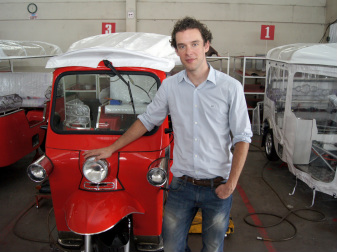
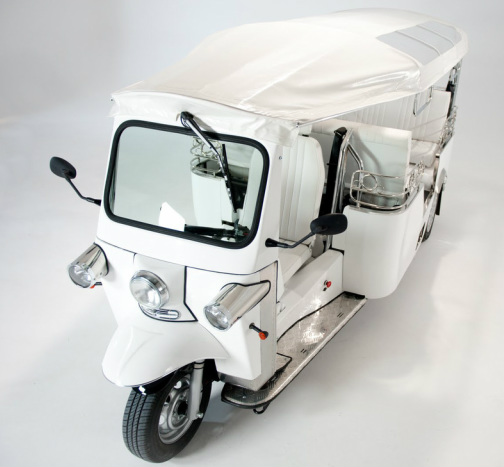
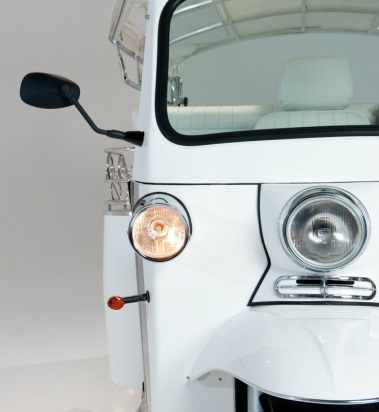
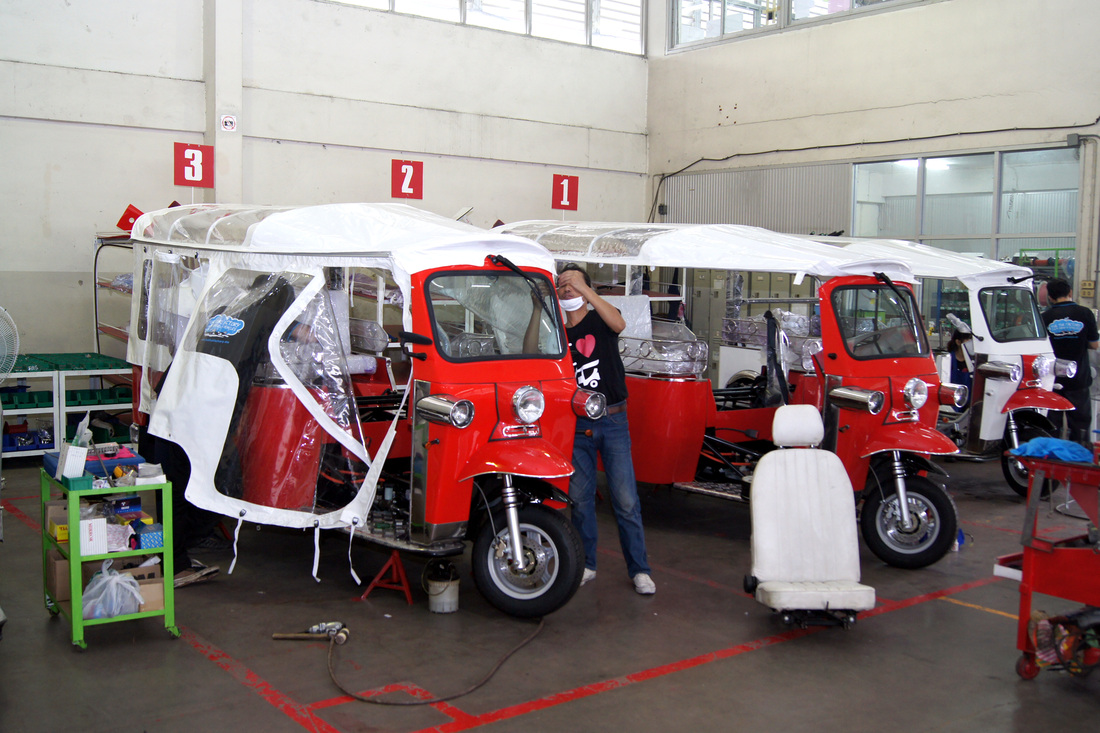
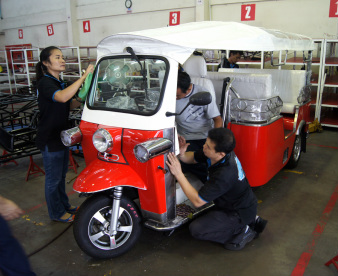
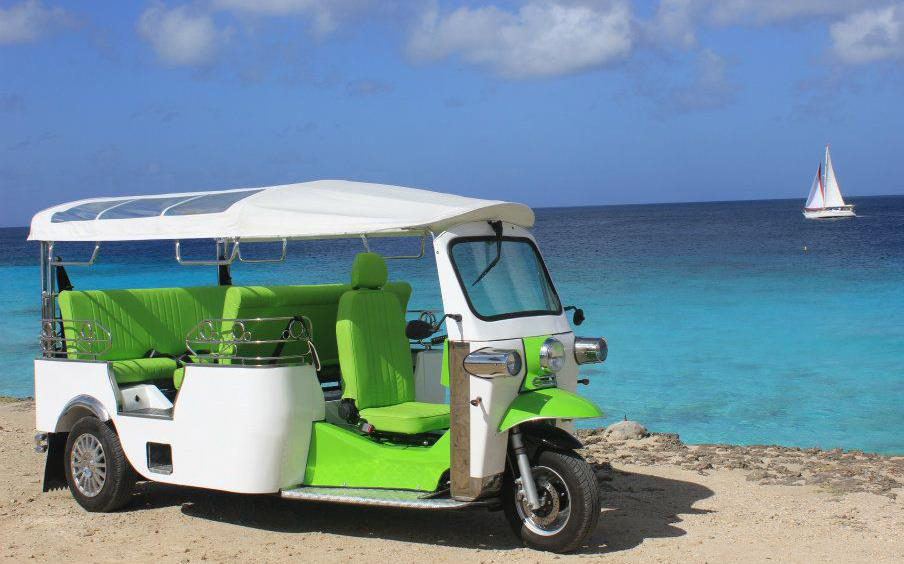
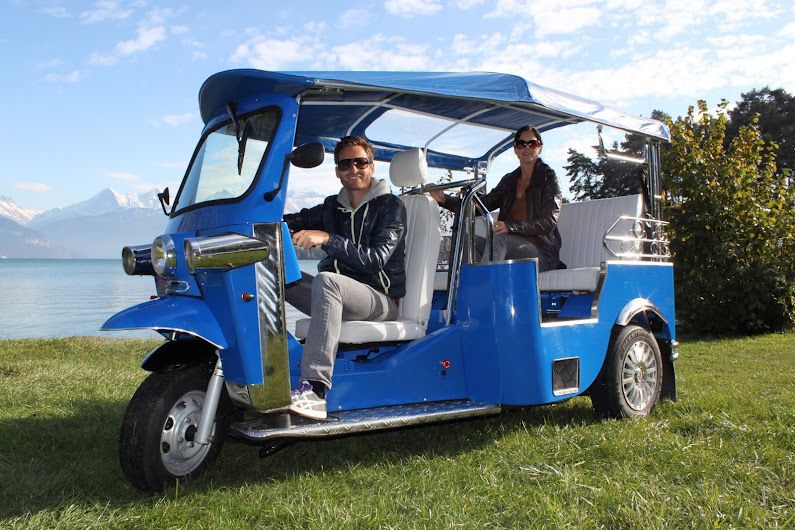
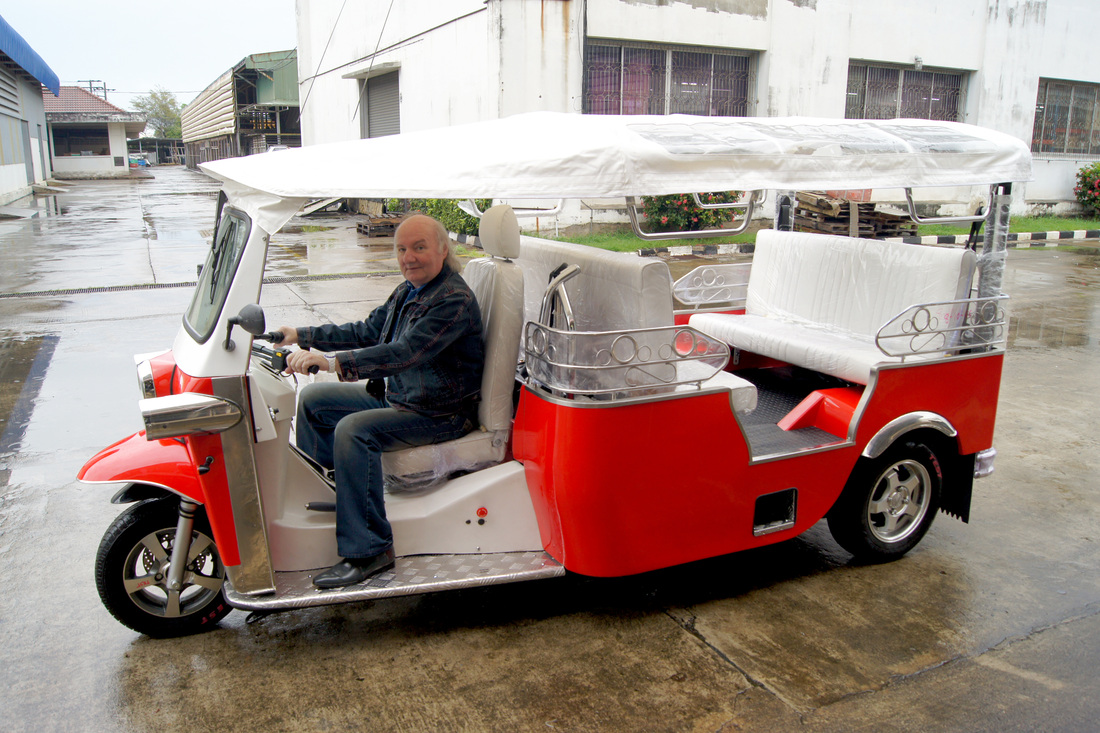
 RSS Feed
RSS Feed



